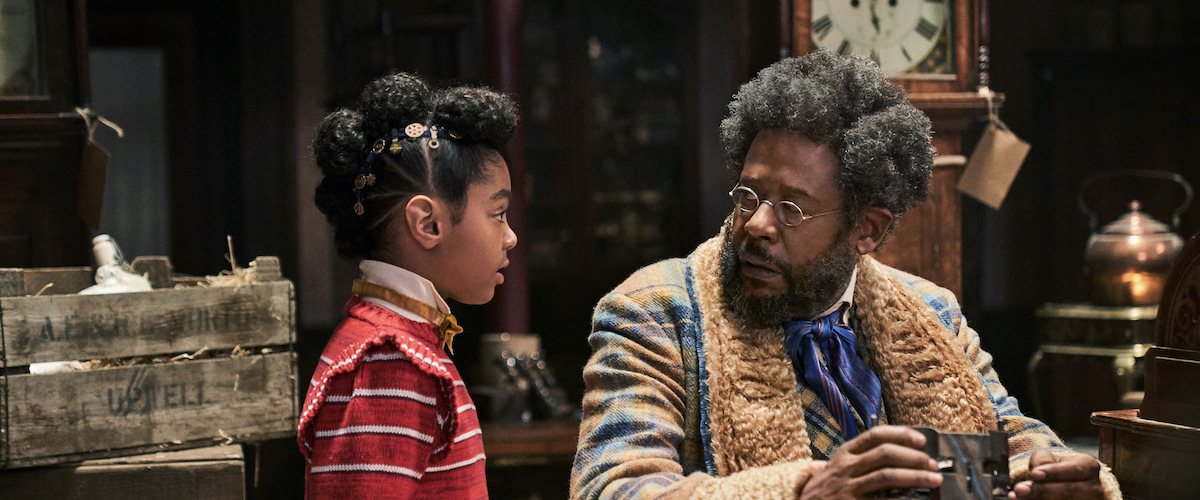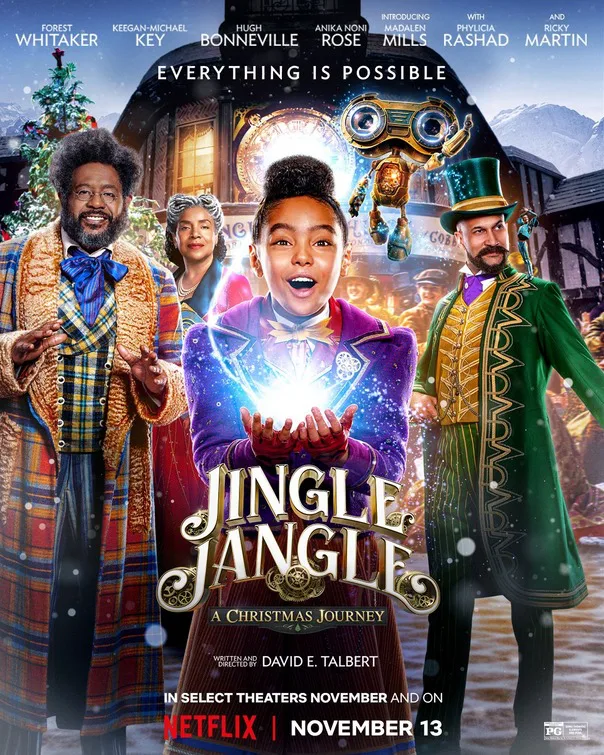“Colorful” is not a colorful enough word to describe a fantasy movie musical so maximalist that even the title is overstuffed. “Jingle Jangle: A Christmas Journey” packs a lot into the movie’s title, including two character names and the dual ideas of something cute and something a little more heartwarming, with a touch of the spiritual.
It has all of that and more, more, more. But Christmas is a time of excess, and the many pleasures of this overflowing Christmas stocking of a film are sure to make it a family favorite, and most likely a family tradition. Originally conceived as a musical play, it retains the liveliness of an in-person production. The exceptionally strong and nearly all-Black cast gives the film a fresh perspective, and it is heartening to see Black characters in a story that is not just about their being Black.
The setting is a fantasy Dickensian steampunk, gorgeously conceived by production designer Gavin Bocquet (“Stardust,” “Miss Peregrine's Home for Peculiar Children,” and the underrated “Jack the Giant Slayer“) and by costume designer Michael Wilkinson. You will want to watch it on the biggest screen possible because every frame is bursting with delightfully enticing details to reward many repeat viewings.
The film begins as a new Christmas story told by a grandmother (Phylicia Rashad) from a huge book with intricately spinning gears on the cover. It is about a toymaker named Jeronicus Jangle (played by Justin Cornwell as a young man, and Forest Whitaker as an older man). Jangle has a whole notebook filled with designs for his enchanting toys and a store called Jangles and Things filled with happy customers.
He also has a devoted wife, daughter, and an assistant named Gustafson (Miles Barrow as a young man, Keegan-Michael Key as the older version). He has been waiting for one last ingredient to bring his greatest invention to life. The package arrives, and Jangle is so happy that he gives his inventory away to the customers, leading to a spectacularly energetic Broadway-style musical number, with athletic spins and jumps choreographed by “The Greatest Showman’s” Ashley Wallen. I admit to watching it and the snowball fight scene later in the film a couple of extra times for some cheer during a stressful week.
The ingredient Jangle was waiting for works, bringing to life a little mechanical bullfighter with a very big ego (amusingly voiced by Ricky Martin). Jangle is overjoyed, planning to manufacture one for every child in the world. But the bullfighter is arrogant and selfish. He wants to be the only one. He persuades Gustafson to steal him and the notebook of designs. In a poignant CGI scene showing us the next decades, with characters designed to look like carved toys, we see that Jangle loses everything.
The toyshop becomes a pawnshop. The happy inventor becomes a recluse.
Years later, Jessica is grown and has a daughter of her own, named Journey (sweet-voiced and utterly captivating newcomer Madalen Mills). She comes to stay with Jangle just before Christmas. At first, he is grouchy and stand-offish. But it turns out that she has a gift for inventing, too, and Jangle’s inspiration begins to return.
One of the film’s producers is John Legend, which means the music is glorious, with a superb score by John Debney and fine songs from Davy Nathan and Philip Lawrence. The singing is superb, especially from Sharon Rose as Joanna Jangle, Anika Noni Rose as the adult Jessica, Cornwell as young Jangle, and Mills as Journey. Key has a lot of fun with a villain song as he tries to promote his own invention, the toy he could never quite get right.
The storyline is a bit over-plotted and the cast a bit overpopulated. I haven’t even mentioned the banker played by Hugh Bonneville or the postmistress with a crush on Jangle and a powerhouse ballad to try to get his attention. But it only adds to the sense of generous abundance that keeps the film bursting with energy and so much goodwill it is ends up almost as irresistible as it wants to be.
Now available on Netflix.




















